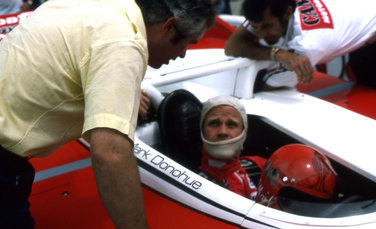Team Penske's Historical Record Speed Runs
August 3, 2020
"Penske Material" provides an inside look at some of the personalities, stories and moments that make Team Penske so unique.
It has been nearly 45 years since Team Penske wrote its name in the record books with legendary driver Mark Donohue and the team establishing a new closed-course speed record. The story behind the run to the record is an interesting one, and it’s also not the only time that the team has set a new bar for speed.
In 1975, Team Penske Hall of Famers Roger Penske and Mark Donohue announced that the team would make an attempt to surpass the world closed-course speed record during Daytona Speedweeks with the CAM2 Motor Oil Porsche 917-30. The car going for the record was the same one that Donohue drove to the 1973 Can-Am Challenge Cup Championship – one of the most powerful race cars in history famously nicknamed the “Can-Am killer.” The Porsche was specifically designed for road racing, not superspeedways. The focus on pure speed on the bigger ovals caused an issue with the turbocharged intake system, which resulted in the loss of two engines during early practice runs. While the team remained focused on establishing a new mark, they decided to delay the attempt at the record while they figured out a solution to the engine challenge.
After working with Porsche to further develop the 5.0-liter 12-cylinder engine to solve the air intake issue, another attempt was announced to take place at the 2.66-mile Talladega Superspeedway on Saturday, August 9 in advance of the Talladega 500 NASCAR Cup Series race.
Penske stated in the official press release on July 23, 1975, “We have worked with the Porsche factory in Germany to further develop their turbocharged 5.0-liter engine which develops over 1,100 horsepower for the type of wide-open running required at Talladega. During our testing program, Mark has run speeds in the neighborhood of the current record, so we are all looking forward to our attempt.”
 Donohue was competing for the Team Penske Formula One team in Europe but he took advantage of a break in the racing schedule to return to the states for the record attempt. In practice runs early in the week, the record attempt was nearly derailed once again after Donohue turned just three laps and returned to pit lane to check tire pressures. A plastic tie-wrap worth about one cent ignited on the Porsche 917-30 and the fire spread to some wiring and the fiberglass tail section of the car. Fortunately, the flames were quickly extinguished and Donohue, the 38-year-old Brown University graduate and 1972 Indianapolis 500 winner, was unharmed and the engine also survived without any damage. Another tail section was flown in from the Team Penske race shop in Reading, Penn., so the attempt at the record could continue. Donohue won the gamble against rain and wind at Talladega that day as he got in some clean runs. From a standing start, his first lap attempt was 195 mph. He then got more comfortable with the track and the car’s capabilities on the high banking and posted a top lap of 221.160 mph, which shattered the existing closed-course record of 217.854 mph established by A.J. Foyt with his Indy car at Talladega in 1974.
Donohue was competing for the Team Penske Formula One team in Europe but he took advantage of a break in the racing schedule to return to the states for the record attempt. In practice runs early in the week, the record attempt was nearly derailed once again after Donohue turned just three laps and returned to pit lane to check tire pressures. A plastic tie-wrap worth about one cent ignited on the Porsche 917-30 and the fire spread to some wiring and the fiberglass tail section of the car. Fortunately, the flames were quickly extinguished and Donohue, the 38-year-old Brown University graduate and 1972 Indianapolis 500 winner, was unharmed and the engine also survived without any damage. Another tail section was flown in from the Team Penske race shop in Reading, Penn., so the attempt at the record could continue. Donohue won the gamble against rain and wind at Talladega that day as he got in some clean runs. From a standing start, his first lap attempt was 195 mph. He then got more comfortable with the track and the car’s capabilities on the high banking and posted a top lap of 221.160 mph, which shattered the existing closed-course record of 217.854 mph established by A.J. Foyt with his Indy car at Talladega in 1974.
“It wasn’t easy,” Donohue told a group of reporters following the record run. “It’s easy to say you’re going to do it, and it’s easy to say you’ll hold the throttle down all the way around, but it isn’t easy to actually go wide open. I might have gone a little faster, too, but I got chicken. When you go into the turns here at that speed, you instinctively back off a little because you think there’s no way the car could go through that fast. But the centrifugal force holds the car on the turn’s banking.”
Tragically, the achievement of the new record was one of the last of Donohue’s many accomplishments on track. He died just 10 days later after he was injured in a practice accident for the Austrian Grand Prix.
 Since the 1975 record run at Alabama, two more Team Penske drivers established world closed-course speed records. Rick Mears won the pole at the newly-paved, two-mile Michigan International Speedway (MIS) oval in August of 1986 with a new record speed of 223.401. Just a few months later, Mears raised the bar even higher when he posted a record lap of 233.934 mph while testing in November at MIS.
Since the 1975 record run at Alabama, two more Team Penske drivers established world closed-course speed records. Rick Mears won the pole at the newly-paved, two-mile Michigan International Speedway (MIS) oval in August of 1986 with a new record speed of 223.401. Just a few months later, Mears raised the bar even higher when he posted a record lap of 233.934 mph while testing in November at MIS.
“There was more speed there but we were fighting track conditions and a push,” said Mears after the record lap. “It was cold and the tire grip wasn’t what it could be. The car was pushing pretty good and I had to lean on it.”
In 2000, Gil de Ferran turned the fastest official closed-course lap in the history of auto racing when he captured the pole for the Marlboro 500 at California Speedway (now Auto Club Speedway). The 241.428 mph lap on the two-mile oval surpassed the pole-winning lap of 240.942 mph posted by Mauricio Gugelmin in 1997 during the CART race at California Speedway.
 “That lap was not really that difficult, to be quite honest,” said de Ferran after winning the pole for the final CART race of the 2000 season. “I wasn’t sliding the car at all and I had only a little bit of oversteer. When I felt the car under me was so solid, there was no way I was going to lift. After that first lap, I said, ‘That’s it! Over! Done!’” de Ferran wound up finishing third in the race to claim the first of his two consecutive CART Series championships for Team Penske. The lap posted by de Ferran continues to hold the world closed-course speed record to this day.
“That lap was not really that difficult, to be quite honest,” said de Ferran after winning the pole for the final CART race of the 2000 season. “I wasn’t sliding the car at all and I had only a little bit of oversteer. When I felt the car under me was so solid, there was no way I was going to lift. After that first lap, I said, ‘That’s it! Over! Done!’” de Ferran wound up finishing third in the race to claim the first of his two consecutive CART Series championships for Team Penske. The lap posted by de Ferran continues to hold the world closed-course speed record to this day.
Since Donohue’s blistering lap at Talladega in 1975, the Alabama track still holds the record for the fastest lap in NASCAR history. Bill Elliott won the pole at Talladega in 1987 with a lap clocked at 212.809 mph. Team Penske’s Rusty Wallace circled the track with a lap of 216.309 mph on June 9, 2004, but Elliott’s speed stands as the official record because Wallace’s lap was recorded during a test session and not during a sanctioned race event weekend.
Now, 45 years after the remarkable run, the speed posted by Donohue and Team Penske in the Porsche 917-30 remains the fastest ever recorded at Talladega Superspeedway.
More Penske Material
Read more about the personalities, stories and moments that make Team Penske unique.

